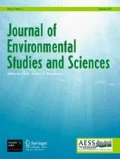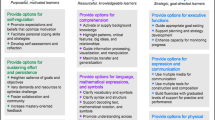Abstract
We conducted an investigation on the efficacy of service-learning in large environmental biology classes. We were interested in whether or not service-learning in classes with over 200 students has an impact on content learning, and attitudes/behaviors related to the content. Students completed a pre-survey, a service project, and reflection paper (experimental group), and a post-survey. Comparing pre- and post-surveys, student responses to attitude, and behavior questions revealed a positive impact on environmental worldview. Student confidence in understanding course content improved in the specific areas related to service projects. Overall, our study shows that large classroom learning is enhanced by short-term service-learning projects.



Similar content being viewed by others
References
Anaya G (1999) College Impact on Student Learning: Comparing the Use of Self-Reported Gains, Standardized Test Scores, and College Grades. Res High Educ 40:499–527
Astin AW, Sax LJ (1998) How Undergraduates are Affected by Service Participation. J Coll Stud Dev 39(3):251–263
Barkley EF, Cross KP, Major CH (2005) Collaborative learning techniques. A handbook for college faculty. Jossey-Bass Inc., San Francisco, CA
Boss JA (1994) The effect of community service on the moral development of college ethics students. J Moral Dev 23(2):183–198
Campus Compact. (2008) Service Statistics 2008. Highlights and Trends from Campus Compact’s Annual Membership Survey
Cohen J, Kinsey DF (1994) Doing good and scholarship: a Service-Learning Study. J Educ 48(4):4–14
Driscoll A, Holland B, Gelmon S, Kerrigan S (1996) An assessment model for service-learning: comprehensive case studies of impact on faculty, students, community, and institutions. Mich J Community Serv Learn 3:66–71
EIA. U.S. (2010). Energy Information Administration. Retail Gasoline Historical Prices. http://www.eia.doe.gov/petroleum/data_publications/wrgp/mogas_history.html. Accessed 5/26/2010
Eyler JS, Giles DE Jr (1999) Where's the Learning in Service-Learning? Jossey-Bass Inc., San Francisco
Gibbs G, Lucas L, Simonte V (1996) Class size and student performance: 1984-94. Studies in Higher Ed 21:261–273
Gray MJ, Ondaatje EH, Fricker R, Geschwind S, Goldman CA, Kaganoff T, Robyn A, Sundt M, Vogelgesang L, Klein SP (1998) Coupling Service and Learning in Higher Education: The Final Report of the Evaluation of the Learn and Serve America, Higher Education Program. The RAND Corporation
Hudson W (1996) Combining community service and the study of American public policy. Mich J Community Serv Learn 2:33–42
Kaiser FG, Wolfing S, Fuhrere U (1999) Environmental attitude and ecological behaviour. Environ Psychol 19:1–19
Keen C, Keen J (1998) Bonner Student Impact Survey. Bonner Foundation
Kendrick JR (1996) Outcomes of service-learning in an introduction to sociology course. Mich J Community Serv Learn 2:72–81
Kollmuss A, Agyeman J (2002) Mind the Gap: why do people act environmentally and what are the barriers to pro-environmental behavior. Environ Educ Res 8:239–260
Leege L, Cawthorn JM (2008) Environmental service learning reinforces classroom concepts and engenders environmental responsibility. Journal of College Science Teaching 37:32–36
Mabry JB (1998) Pedagogical variations in service-learning and student outcomes: how time, contact and reflection matter. Mich J Community Serv Learn 5:32–47
Markus GB, Howard JPF, King DC (1993) Integrating community service and classroom instruction enhances learning: results from an experiment. Educ Eval Policy Anal 15:410–419
McKenzie-Mohr D, Smith W (2008) Fostering sustainable behavior. In: An introduction to community-based social marketing. New Society Publishers, Gabriola Island, B.C. Canada
Miller J (1994) Linking traditional and service-learning courses: outcome evaluation utilizing two pedagogically distinct models. Mich J Community Serv Learn 1:29–36
Parker-Gwin RP, Mabry JB (1998) Service-learning as pedagogy and civic education: comparing outcome for three models. Teach Sociol 26:276–291
Pike GR (1995) The relationship between self reports of college experiences and achievement test scores. Res High Educ 3:1–22
Pike GR (1996) Limitations of using students’ self-reports of academic development as proxies for traditional achievement measures. Res High Educ 37(1):89–114
Rajecki DW (1982) Attitudes: themes and advances. Sinauer Associates, Inc., Sunderland, MA
Reed VA, Christian-Jernstedt G, Hawley JK, Reber ES, DuBois CA (2005) Effects of a small-scale, very short-term service-learning experience on college students. J Adolesc 28(3):359–368
Seymour E, Wiese DJ, Hunter AB (2000) Creating a better mousetrap:On-line student assessment of their learning gains. Report to Exxon-Mobil Foundation; also Paper to National Meetings of the American Chemical Society, San Francisco, March 2000
Strage A (2000) Service-learning: enhancing student learning outcomes in a college level lecture course. Mich J Community Serv Learn 7:5–13
Tryon E, Stoecker R, Martin A, Seblonka K, Hilgendorf A, Nellis M (2008) The challenge of short-term service-learning. Mich J Community Serv Learn 14(2):16–26
Vogelgesang LJ, Astin AW (2000) Comparing the effects of service-learning and community service. Mich J Community Serv Learn 7:25–34
Zelezny L, Poh-Pheng Chua C, Aldrich C (2002) New ways of thinking about environmentalism: elaborating on gender differences in environmentalism. J Soc Issues 56:443–457
Acknowledgements
We thank Ray Chandler for help with statistical analysis. Robby Ambler facilitated the initial computer survey by posting it online and collecting and sending us the results. Our community partners, Keep Bulloch Beautiful, Ogeechee (Canoochee) Riverkeepers, and the Georgia Southern Botanical Garden, provided invaluable assistance. Without them we could not have completed this project. Thanks to two anonymous reviewers whose comments significantly improved our manuscript.
Author information
Authors and Affiliations
Corresponding author
Appendices
Appendix 1. Original Survery


Appendix 2. Relevant questions on SALG survey
Rights and permissions
About this article
Cite this article
Cawthorn, M., Leege, L. & Congdon, E. Improving learning outcomes in large environmental science classrooms through short-term service-learning projects. J Environ Stud Sci 1, 75–87 (2011). https://doi.org/10.1007/s13412-011-0001-8
Published:
Issue Date:
DOI: https://doi.org/10.1007/s13412-011-0001-8




